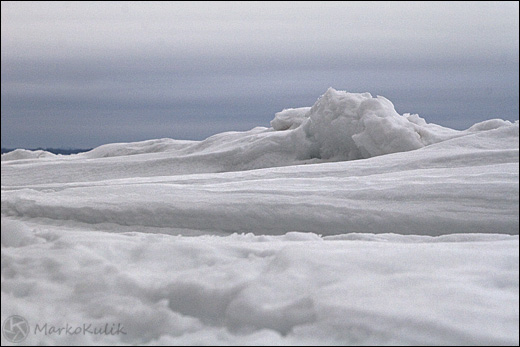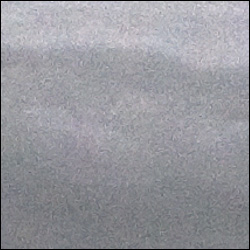Photography podcast #91 discusses 3 common‚reasons‚we get noise in our photographs and we offer tips on how to beat that noise. For the purposes of this podcast, noise is the appearance of coloured‚specks, ‚monochromatic‚specks or bands/lines that appear in your photographs (often in uniform areas like the sky or in the shadowy parts of the image) that should not be there.

Scene from Oka Park Quebec Canada
This image from OKA Park looks pleasing enough and looking at it here you might not know that the image was underexposed. I boosted the levels in Photoshop so at first glance it looks pretty good.
HOWEVER, this 100% crop from the same image reveals the noise (colours in the snow) due to underexposure.

Snow detail crop at 100% shows colour noise
TIP — Don’t automatically underexpose. Underexpose the scene only when necessary.
Links /resources mentioned in this podcast:
Cambridge in Colour article on noise
Noise Ninja
Dfine
Topaz Denoise
Shiny‚is the regular assignment this month on our photography forum
Ton sur Ton is the level 2 assignment this month on our photography forum
Please join the Photography.ca fan page on Facebook
If you liked this podcast and want to review it on Itunes, this link gets you to the main page
My Facebook profile — Feel free to “friend” me — please just mention Photography.ca
My Twitter page — I will follow you if you follow me — Let’s connect — PLEASE email me and tell me who you are in case I don’t reciprocate because I think you are a spammer.
If you are still lurking on our forum,
feel free to join our friendly ![]() Photography forum
Photography forum
Thanks to rabs, Lee Sacrey, Las Vegas Weddings, Charles binns landscape photography, and Michael Van der Tol who posted a blog comment about our last podcast. Thanks as always to everyone that sent comments by email about our last podcast. Although ALL comments are appreciated, commenting directly in this blog is preferred. Thanks as well to all the new members of the bulletin board. Most of the links to actual the products are affiliate links that help support this site. Thanks in advance if you purchase through those links.
If you are looking at this material on any other site except Photography.ca — Please hop on over to the‚Photography.ca blog and podcast and get this and other photography info directly from the source. |Subscribe with iTunes |Subscribe via RSS feed |Subscribe with Google Reader |Subscribe for free to the Photography podcast — Photography.ca and get all the posts/podcasts by Email
You can download this photography podcast directly by clicking the preceding link or listen to it almost immediately with the embedded player below.
Happy Holidays everyone and only the best for 2011 — thanks for listening and keep on shooting!
Podcast: Play in new window | Download



Don’t forget about the effect of the sensor’s temperature on noise. In general, the warmer the sensor the more noise is produced. If possible keep your camera away from external heat sources and avoid live view because it heats up the sensor.
Thanks for the comments and extra tips Jack, muchly appreciated! i tried to keep the podcast really simple because noise can be quite a complex issue. Scott’s logic works well for me and makes perfect sense.
many thanks again!
Forgot to mention, Lightroom 3 and ACR6 has an EXCELLENT noise reduction and you can also remove all noise and add some fake grain, which makes the picture even better.
Marko, just this week Scott Bourne made a comment about noise, and I also think its very true, if you expose for the right side of the histogram, what would be the light areas, you get lesser noise. If you are photographin on RAW mode try to get as much light as possible then darken the image on pos processing that would dramatically decrease noise.
Also light quality influence on ammount of noise, lets say youre photographing a christmas party, using ambient light at night. If the ambient light is bulb light (yellowish light), you lack blue light, the camera will try to compensate this lack for the perfect light for the camera is white light (not blue, not yellow buth both at the same time) and it will introduce a lot of noise, so if you introduce a small pop of flash light the flash will compensate some of the lacking quality and will lower the amount of noise. Do the test, with same high ISO make a flash and non flash picture, youll see how much noise can be reduces just by raising the quality of light.
Happy holidays for everyone and good pictures to all.